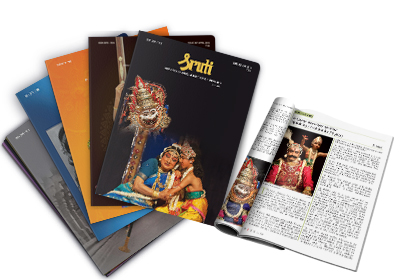COVER STORY
ALARMEL VALLI - A youthful Natya Kala Acharya
V. RAMNARAYAN
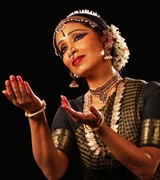
Belgian filmmaker Van den Eynde featured her when she was barely 15 in a documentary on India. BBC was to record her art soon afterwards. Zubin Mehta was so impressed by her dance, he invited her to perform at the Munich Opera Festival.
Making her Bharatanatyam debut at the age of six, she ventured abroad for the first time ten years later, when she did a nine-performance tour of Malaysia chaperoned by her mother Uma – as she was on many subsequent trips – but the turning point of her life came at age eighteen, when she had to face the dilemma of choosing between her pre-university course exams and participating in the Festival of Indian Music and Dance at the Theatre de la Ville in Paris. Encouraged by her parents, Alarmel Valli chose to skip the examination and go to France, and the rest is history.
SPECIAL FEATURE
UMAYALPURAM K. SIVARAMAN - The maestro at 80
V. RAMNARAYAN
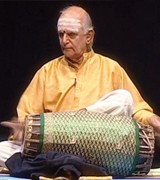
At the Rukmini Arangam at Kalakshetra one evening a couple of years ago to accompany vocalist Sikkil Gurucharan in a concert to launch the Sruti App, the veteran mridangam maestro reached the venue ahead of the other musicians. He surveyed the facilities at the artists’ dressing room, even timed how long it would take for him to go to the washroom from there, in order to be perfectly on time when the concert started. Before that, he had made sure he travelled alone in the car that brought him to Kalakshetra. Completely relaxed and fresh in body and mind, he now unwound enough to chat with the volunteers, crack a joke or two with them, and even bless the Sruti team and the App.
On the concert stage, he was as always seated with back ramrod straight, legs folded at the knees, the mridangam a virtual extension of his anatomy, his forehead generously streaked with vibhooti ash centred by a kumkumam dot. Dressed immaculately in a spotless veshti and bright kurta, he was a picture of concentration, yet with the suggestion of a twinkle, an avuncular warmth in his eye, as he silently encouraged Gurucharan, V. Sanjeev (violin) and Sreesundar Kumar (khanjira), the brilliant team of the evening.
SEASON 2015-16
Random notes
V. RAMNARAYAN
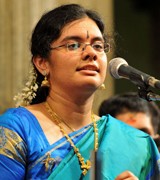
The Season survives the floods
The floods have receded, the sun has come out, and the Chennai December music season is on. Missing still are the usual sparkle of the festival and the swirl of crowds inside the halls and at the canteens, but they are gradually coming back. The musicians on their part are effortlessly proving that they are as resilient as the brave denizens of the city who have done themselves and all of us proud with their gallantry in adversity. The few performances I have attended have been just as absorbing and electrifying as the best fare the circuit usually offers. Some of the programmes I have been to were presented by artists from elsewhere.
Amrutha Venkatesh of Bengaluru, for instance, has been an old favourite of mine for some years now. She is actually a young musician with an impressive voice, and evidently clear views on what kind of music works for her. At the Sivagami Pethachi auditorium for Brahma Gana Sabha, she gave a recital that could have been idiosyncratic had she not rendered every song with the utmost integrity. It was slow or medium paced almost from start to finish, but her sruti and laya sense was impeccable and her understanding of raga music seemed deep and keenly felt. Her nuanced delineation of Sankarabharanam and a super slow M.D. Ramanathan composition in that raga was quite simply outstanding.
MS CENTURY
Can we emulate her in generosity?
SHANKAR RAMACHANDRAN
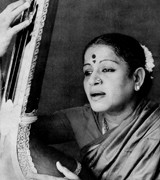
Someone told me you are Kalki’s grandson?” It was a question proffered hesitantly. When I turned to look at the woman, all I saw was her kind yet piercing eyes. She was wearing a black purdah but the veil had been moved. When I answered her question she reached with her two hands and held mine in a warm grip. “Because of your grandfather I was taught to read and write,” she said with a smile that defused some of the intensity in her voice. “When I heard you were at this wedding I wanted to meet you.” She looked at me for a minute and, before I could gather my thoughts and find my voice to utter a response, she melted away.
This incident happened some years ago when I was attending a wedding in Chennai. From the brief words she spoke I learned that Kalki Krishnamurthy and Rajaji had visited this lady’s grandfather at his home. Upon seeing the little girl playing, the two of them suggested that she be given an education. Kalki Krishnamurthy then sat with the little girl, on the ground in front of the house, and guided the small hand to trace the vowels of the Tamil alphabet in the sandy ground.

